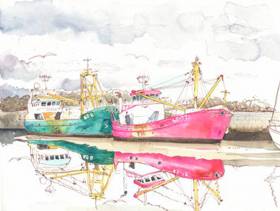Displaying items by tag: BlueFish Project
Capturing The Importance Of The Ocean For Irish & Welsh Coastal Communities Through Art
A series of watercolour illustrations and interviews have captured the importance of the ocean to coastal communities in Ireland and Wales as part of the EU-funded BlueFish Project.
Sharon Sugrue, scientific and technical officer at the Marine Institute, and Galway’s urban sketcher Róisín Curé visited coastal communities in Ireland and Wales that border the Irish and Celtic Seas.
They met with people from a broad spectrum of marine activities including fishing, aquaculture, leisure, transport, tourism and marine renewable energy.
“A key aspect of the project was speaking with people living and working in coastal communities, and gathering their opinions about climate change and learning about how it might affect their livelihoods,” Sugrue said.
“Along with interviewing people and documenting their daily interactions with the sea, the medium of art was also used to record their activities. This was a unique opportunity to talk directly to coastal communities and capture their perspectives through art.”
Róisin Curé produced a series of watercolour illustrations that captured snapshots of these coastal communities and people’s daily lives.
The results of the interviews and art, through watercolour illustrations, created an accessible way for the public to understand the importance the ocean has on livelihoods in coastal communities.
By engaging with people and industries dependant on the sea, the information gathered highlighted how they benefit from the ocean, their thoughts on climate change, and particularly how it was going to affect their lives and businesses.
Comments made by fishermen stated that without the ocean, they wouldn’t have a living, as it’s their only source of income in their rural parts of Ireland.
“Many of the stories reaffirmed the importance of the age-old relationship between people and the sea, noting that the sea is the life-blood which sustains these communities,” Sugrue said.
“The general consensus in both Ireland and Wales coastal communities was that climate change is happening. There was an acknowledgment and a realisation amongst the people interviewed that there was a real looming threat to their livelihoods.”
Many people commented on how they were seeing changes to their climate in their local communications. A local businessman from Anglesey said: “In the 38 years I’ve been working here, the road would have flooded twice a year. Now it floods much more often.”
Curé said: “I felt privileged to sketch, at close quarters, people whose ingenuity has turned a potentially hostile ocean into a source of income. I hope that the same ingenuity will provide the answers to the challenges we’re facing with the effects of climate change.”
In August 2018, the ports of Dingle in Co Kerry, Baltimore in Co Cork, Kilmore Quay in Co Wexford and Howth in Co Dublin were visited and fishermen, restaurateurs, shellfish producers, operators in the tourism sector and seafarers were interviewed.
The Welsh coastal communities were visited in October and included Anglesey, Bangor, Pwllheli, New Quay, Milford Haven and Pembrokeshire.
Sugrue added: “This project has given me the opportunity to engage with those living and working in coastal communities in a personal and hands on way.
“Growing up by the sea and being part of a family business in aquaculture, I felt an affinity with the people interviewed. It also brought home to me the effect that climate change could have in a ‘real sense’ showing how these effects could ripple through these communities.”
Linking science and art as a mechanism to convey the importance of the ocean to coastal communities and the potential impacts of climate change on these communities will continue throughout 2019, where the project will feature at maritime festivals in Ireland and Wales and continue the dialogue with these coastal communities.
The BlueFish Project is a partnership between six organisations in Ireland and Wales including the Marine Institute, University College Cork, Bord Iascaigh Mhara, Bangor University, Aberystwyth University and Swansea University.
The marine science research project is funded by the Ireland Wales 2014-2020 European Territorial Co-operation (ETC) Programme. The purpose of this maritime programme is to connect organisations, businesses and communities on the West coast of Wales with the South- East coast of Ireland.
Through engagement with coastal communities and art, the BlueFish Project, launched in September 2017, aims to develop knowledge and understanding of the marine resources and the potential impacts of climate change on the Irish and Celtic Sea ecosystem.
To find out more about the BlueFish Project, visit BlueFishProject.com

























































